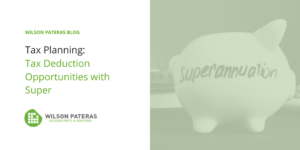THE BIGGEST SUPER CHANGES EVER – ACT NOW!

Major changes to tax and superannuation were approved by the Government in early December 2016.
These are the biggest changes in the last 10 years – they are significant changes and will affect how your own superannuation is taxed now and in the future.
The start date for the majority of these changes begins on 1 July 2017. That’s why we need to start planning ASAP with you.
The changes are so significant and incredibly complex that planning and implementation of your superannuation strategy could take in excess of 2 months. To ensure your strategy is enacted prior to 30th June 2017 you’ll need to contact us at your earliest opportunity to make an appointment. Only prompt attention will ensure you are not financially worse off from 1 July 2017.
The changes and how they may affect you are summarised here:
1. Reduction of tax free income – Introduction of a $1.6 million cap
From 1 July 2017, the most that any one person can have as a pension balance is $1.6 million. This basically means that the earnings generated from this amount will be taxed free. However, if your balance is in excess of $1.6 million, then that balance is removed from your pension account and the earnings on the amount will be taxed at 15%.
| Members Balance in pension before 1 July 2017 | $2,000,000 |
| Members Balance in pension on 1 July 2017 | $1,600,000 |
| Members Balance in accumulation on 1 July 2017 | $400,000 |
| As 20% of the members balance is in accumulation (i.e. earnings are taxed), then 20% of the earnings will also be taxed. Therefore if the fund earned $200,000 in income, $40,000, representing 20% of the income, will be taxed at 15%.
|
|
In other words, super funds that enjoyed tax free income will no longer be tax free. Refunds that have occurred due to franking credits refunds will be now be reduced!
Any sale of assets will now incur Capital Gains Tax!
2. Removal of the Tax Free income if you are receiving a Transition to Retirement Pension
From 1 July 2017, income from assets supporting a Transition to Retirement Income Stream (TRIS) will no longer be tax free. They will be taxed at 15%. This means that not only are you reducing your super balance by compulsory drawing down from your super, the taxman is also taking out 15% from its earnings thereby further reducing your balance!
This year is the last year your fund will enjoy a tax free status. This change will force members to weigh up the benefit of whether to continue with their TRIS.
3. Capital Gains Tax Opportunities
Due to the changes in the tax status of super funds, the law will give an opportunity for funds to reset the cost of the assets in the fund. This will be relevant for super funds that:
- Are forced to reduce their pension balance to $1.6m or Super Funds that are in a TRIS
In essence, the law allows you to reset the cost of those assets to a market value prior to 1 July 2017. This will then be deducted from the sale price of the assets if sold to work out the taxable capital gain.
Continuing the above example, say 20% of your fund is in accumulation. An asset was sold as follows:
| Cost when originally bought | $500,000 |
| Market Value 30 June 2017 | $1,250,000 |
| Sold 30 June 2021 | $2,000,000 |
| A comparison of planning vs non-planning is as follows: | Planning | No Planning |
| Sale Price | $2,000,000 | $2,000,000 |
| Cost Base | $1,250,000 | $500,000 |
| Capital Gain | $750,000 | $1,500,000 |
| x % of fund in accumulation (20%) | $150,000 | $300,000 |
| Tax Payable at 10% | $15,000 | $30,000 |
Therefore without the correct planning, you could be paying more money to the Government than required!
The use of the CGT Relief is a complex area and must be considered carefully before any strategy is implemented.
4. Death Trap
A consequence of the changes is that if your wish is to leave your pension balance to your spouse, and you die, then that pension balance is added to your spouse’s member’s balance. If your spouse had a pension, then both pensions are added together to determine if the $1.6 million cap is exceeded. If exceeded, then the remaining spouse has 12 months to reduce the pension balance back to $1.6 million.
What does this mean? It means that assets, including property, shares and cash may need to leave the super fund in order to comply, otherwise penalties will be imposed. Appropriate strategies should be implemented to reduce the impact.
5. Last chance to increase super balances quickly
Up to 30 June 2017, the after tax contributions (known as non-concessional) that a member can contribute to a fund is $180,000 for one year or $540,000 to cover three years (if under 65 years old). From 1 July 2017, this will be reduced to $100,000 and $300,000 respectively.
Therefore, if maximising the amount that you have in super is your objective, then there is only 6 months to act.
6. Special rules for Defined Benefits
If you are in a defined benefit fund, we need to know ASAP. This could have a major impact in relation to whether or not you will breach the $1.6 million cap.
The above is a brief snapshot of how the changes may impact super funds. It is important you discuss the effects of the 2016 superannuation reform with your adviser. The areas of change are extremely complex and unique to each individual which will require further discussion.
There are many alternatives that could minimise the impact of these changes depending on what you want to achieve for yourself and future generations. We invite you to contact us now to plan your superannuation strategy.





